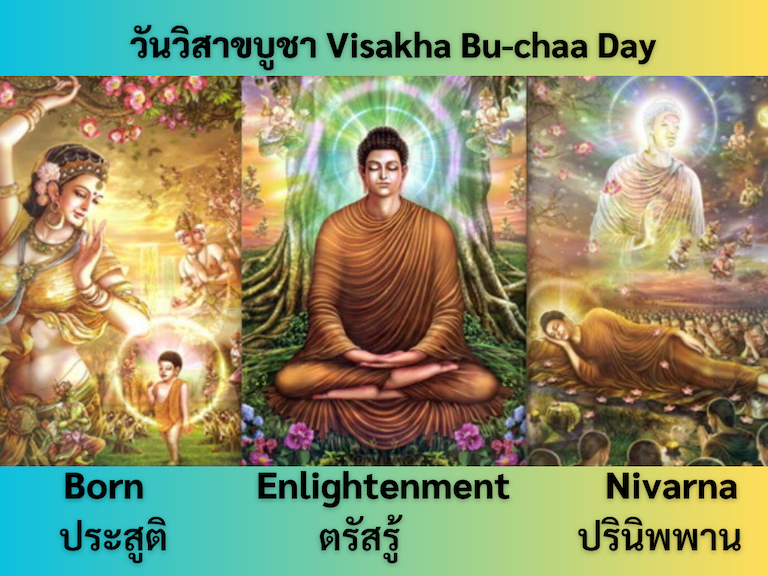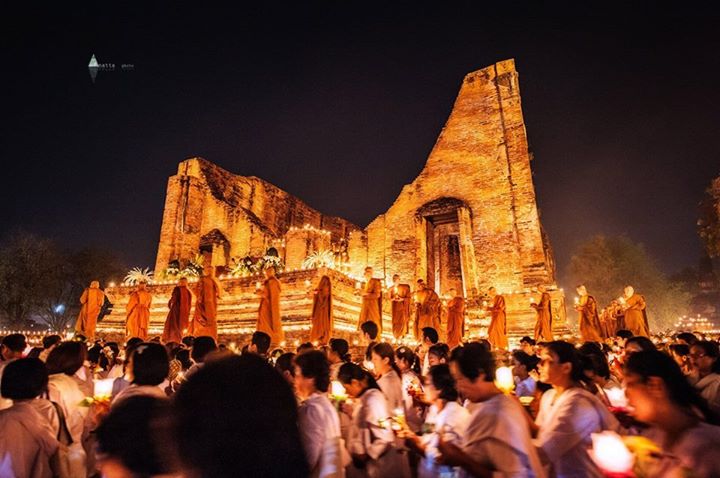
Visakha Bucha Day วันวิสาขบูชา (wan wí-săa-kà boo-chaa) , an important religious holiday in Thailand, is traditionally celebrated based on the lunar calendar, typically occurring on the full moon of the sixth lunar month. However, due to the occurrence of an additional lunar month this year, Visakha Bucha Day will fall on June 3rd, 2023 (วันที่ 3 มิถุนายน : wan têe 3 mí-tù-naa-yon 2566) , coinciding with the full moon of the seventh lunar month. As June 3rd falls on a Saturday, the substitute holiday (วันหยุดชดเชย wan yùd chód chiey) for Visakha Bucha Day will be observed on Monday, June 5th.
Visakha Bucha Day commemorates three significant milestones in the life of Gautama Buddha, the founder of Buddhism. These events, believed to have taken place on the same day of the full moon in the month of Visakha, include:
- Birth (ประสูติ bprà-sòod): Visakha Bucha Day honors the birth of Gautama Buddha. According to traditional accounts, he was born in Lumbini, present-day Nepal, and his birth is considered a momentous occasion that marked the beginning of his journey towards enlightenment.
- Enlightenment (ตรัสรู้ dtàd-sà-róo) : The day also celebrates the enlightenment of Gautama Buddha, often referred to as his awakening. It was under the Bodhi tree (ต้นโพธิ์ dtôn-poe) in Bodh Gaya, India, that he attained profound insight and understanding into the nature of existence, liberating himself from the cycle of rebirth and suffering.
- Passing Away (ปรินิพพาน bpà-rí-níb-paan ): Lastly, Visakha Bucha Day commemorates the passing away, or parinirvana, of Gautama Buddha. After teaching and guiding his disciples for many years, the Buddha reached his final moments and attained complete release from the cycle of life and death.
The enlightenment of Gautama Buddha, along with his teachings known as the Four Noble Truths (“อริยสัจ4” in Thai), are fundamental aspects of Buddhism. Here’s an explanation of each:
- The Truth of Suffering – This truth acknowledges that suffering (ทุกข์ túg) is an inherent part of human existence, encompassing physical and mental pain. It recognizes the universal experience of dissatisfaction, unsatisfactoriness, and the impermanence of worldly pleasures.
- The Truth of the Origin of Suffering – This truth identifies craving and attachment (สมุทัย sà-mùp-tai) as the root cause of suffering. It states that clinging to desires, attachments, and the illusion of a separate self leads to suffering. The craving for sensual pleasures, existence, and non-existence are considered the primary sources of suffering.
- The Truth of the Cessation of Suffering – This truth asserts that suffering can cease (นิโรธ ní-rôed) by eliminating the causes and conditions that give rise to it. It teaches that by abandoning craving and attachment, one can experience the cessation of suffering and attain a state of peace and liberation.
- The Truth of the Path to Cessation of Suffering – This truth outlines the Noble Eightfold Path (มรรค มีองค์ 8 mág mee ong bpàed) as the way to overcome suffering. It presents a practical and ethical path that includes right understanding, right intention, right speech, right action, right livelihood, right effort, right mindfulness, and right concentration. By following this path, individuals can cultivate wisdom, morality, and mental discipline, leading to the cessation of suffering.
What buddhist do on Visakha Bucha’s day?

- Temple Visits(ไปวัด bpai wád): Devotees visit temples or monasteries, known as “วัด wád” in Thai, to make merit and participate in religious ceremonies. They bring offerings such as flowers, candles and incense to the temple .
- Alms Giving (ทำบุญ tam-bun): Offering alms to monks is an important practice on Visakha Bucha Day. Devotees wake up early in the morning to give alms, which can include food, daily necessities, or monetary donations, to the monks. This act of generosity is believed to accumulate merit and express gratitude for the teachings of the Buddha.
- Five Precepts (ถือศีล 5 těu sěen hâa) : Thai Buddhists often observe the Five Precepts on Visakha Bucha Day. These precepts include refraining from killing, stealing, engaging in sexual misconduct, lying, and consuming intoxicants. Devotees make a conscious effort to uphold these ethical guidelines as a way to purify their actions and cultivate moral conduct.
- Candlelit Processions (เวียนเทียน wian-tian): In the evening, candlelit processions take place around temples or sacred sites. Participants carry lit candles and walk in a clockwise direction around the main temple building or stupa. This symbolic act represents the illumination of wisdom and the light of the Buddha’s teachings. It is a solemn and meditative practice that expresses reverence and devotion.
- Dhamma Talks and Meditation สนทนาธรรม และ นั่งสมาธิ (sǒn-tá-naa tam láe nâng sà-maa-tí): Temples often organize Dhamma talks and meditation sessions on Visakha Bucha Day. Monks deliver sermons on Buddhist teachings, emphasizing mindfulness, compassion, and the path to liberation. Meditative practices are encouraged, allowing devotees to deepen their understanding of the Dhamma and cultivate inner peace.
So now you know about Visaka Bucha day, If you are dating Thai girl or your girlfriend or your Thai wife ask you to go temple on some buddhism holiday then you can understand why she ask you to go with . Even though you are not buddhism it is also a nice things to see and learn about our religion .